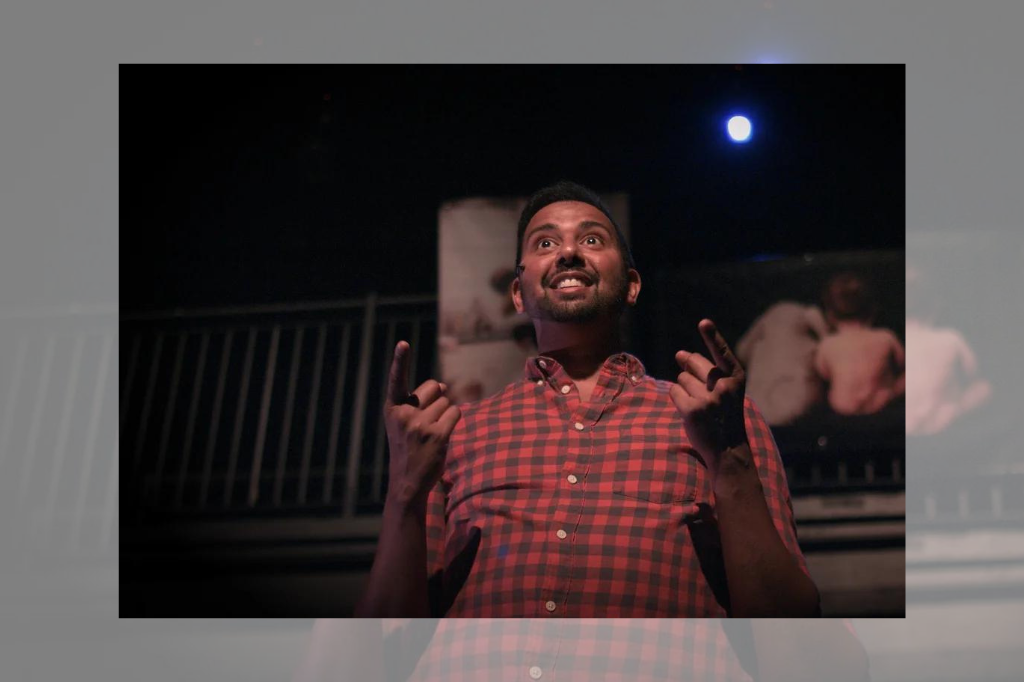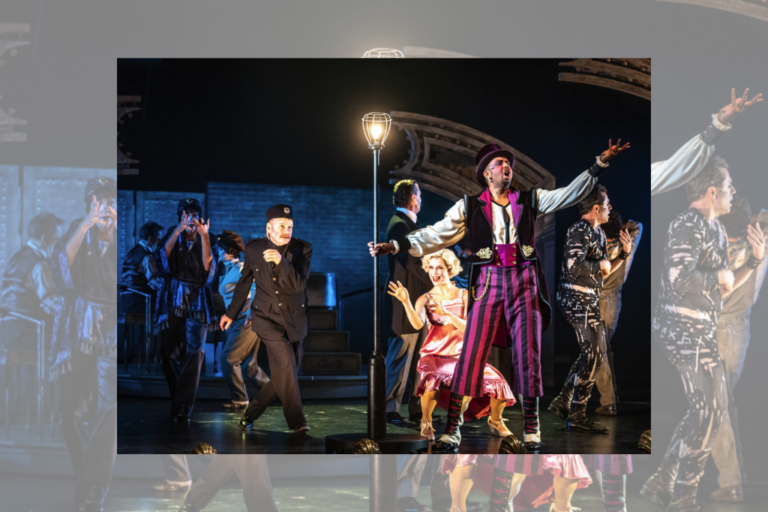REVIEW: In One Step At A Time, Andrew Prashad unpacks disability through tap dance
At its core, One Step At A Time by Andrew Prashad contains one of the most powerful stories you could possibly imagine.
Prashad, a world-class tap dancer, becomes the father to Ezra, a child with spina bifida. Just as his career as a performer really begins to take off, he must also navigate the complexities of fatherhood to a little boy who requires multiple surgeries and the use of mobility devices. In this uplifting hour-long performance, Prashad shares his profound love, devotion, fears, and inner strength with the audience through a mixture of storytelling, images, video, song, and — most impressively — tap dance. While taking it all in at Grand Theatre’s suitably intimate Auburn Stage, I was struck by the deep vulnerability and raw athleticism Prashad brought to his stirring one-man show.
Prashad’s abilities as a tap dancer can’t be overstated. He is clearly a master of his craft. His extreme talent ensures this underutilized artform feels fresh and vital in 2024. Using tap to express his layered inner journey, he truly dazzles the audience with his emotionally charged extreme feats of physical prowess.
Plus, it’s improvised! Because tap dance became popular at the same time as jazz music in the nineteenth and twentieth centuries, it similarly requires its artists to be able to make creative choices on the fly. That means each performance of One Step At A Time is unique and directly responds to how Prashad feels on that particular day. This live curation of his feelings through movement is what gives this play an undeniable immediacy and ensures Prashad is present with us every step of the way.
His tap dance skills may also bring London audiences back to his fan-favourite Grand Theatre performance in 2022’s Grand Ghosts. This show started London’s love affair with Prashad, and we’re clearly still along for the ride. He even mentions the significance of this performance in his trajectory as an actor in One Step. Prashad’s openness through dance and story in One Step gives the audience a full sense of his personal journey as an artist and father. He has that rare star power quality where it feels like he’s giving you a gift by sharing his story with you. All around me, I could feel the audience’s deep investment in Prashad and Ezra’s lives.
Was there room to consider other production choices throughout the show? I think so. I found the accompanying instrumental recorded music a little earnestly sweet for my taste. I also wonder about the choice to include a number of projected still images and video of Ezra, including photos of his scar. I am one of those people who worries about the privacy of children featured in photos posted online by well-meaning, loving parents. How much agency should children have over their own stories? This is a complex question important to our times, I think. I’m confident in this case that Prashad discussed these choices in detail with his family, and that he’s wrapped tightly in their warm support for this show. When he’s a little older, I would certainly love to see a sequel of sorts from Ezra’s perspective.
There were many highs throughout the evening, including a lively talkback after the show. After Prashad bravely bares his soul to the audience, he then welcomes everyone to stay and opens up the room to conversation about what they just witnessed. Tellingly, most of the audience stayed to get a little more time with this talented father of three. Every talkback is unique of course, but in the version I saw, Prashad elaborated on a number of areas explored in the show including his wife’s journey and Prashad’s experience as a person of colour in the entertainment industry.
Prashad also demonstrated great advocacy skills throughout the talkback by highlighting differing views on the concept of “inspiration” in the disability community. Many audience members understandably wanted to applaud Prashad and Ezra’s story for its inspirational elements. Gently and clearly, Prashad guided the audience to see how their big-hearted statements might be unintentionally ableist in nature. When I attended, he also discussed the effect charities serving families with children with spina bifida have had on his family — and the limitations to Ontario’s health care, which excludes coverage for catheters.
Ultimately, it is the beautiful beam of love that Prashad feels for Ezra that shines through in every moment on stage. Even though I wonder about future Ezra’s thoughts on his story being shared in this way, Prashad’s play is undeniably impactful and advocates for the spina bifida community with great passion and joy. I’m confident this performance will ensure London audiences will be able to step along with Prashad in many future Grand Theatre productions to come.
One Step At A Time runs until April 20. Tickets are available here.
Intermission reviews are independent and unrelated to Intermission’s partnered content. Learn more about Intermission’s partnership model here.














Comments